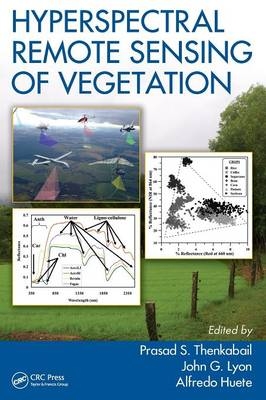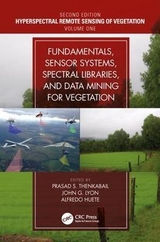
Hyperspectral Remote Sensing of Vegetation
Crc Press Inc (Verlag)
978-1-4398-4537-0 (ISBN)
- Titel erscheint in neuer Auflage
- Artikel merken
Hyperspectral Remote Sensing of Vegetation integrates this knowledge, guiding readers to harness the capabilities of the most recent advances in applying hyperspectral remote sensing technology to the study of terrestrial vegetation. Taking a practical approach to a complex subject, the book demonstrates the experience, utility, methods and models used in studying vegetation using hyperspectral data. Written by leading experts, including pioneers in the field, each chapter presents specific applications, reviews existing state-of-the-art knowledge, highlights the advances made, and provides guidance for the appropriate use of hyperspectral data in the study of vegetation as well as its numerous applications, such as crop yield modeling, crop and vegetation biophysical and biochemical property characterization, and crop moisture assessment.
This comprehensive book brings together the best global expertise on hyperspectral remote sensing of agriculture, crop water use, plant species detection, vegetation classification, biophysical and biochemical modeling, crop productivity and water productivity mapping, and modeling. It provides the pertinent facts, synthesizing findings so that readers can get the correct picture on issues such as the best wavebands for their practical applications, methods of analysis using whole spectra, hyperspectral vegetation indices targeted to study specific biophysical and biochemical quantities, and methods for detecting parameters such as crop moisture variability, chlorophyll content, and stress levels. A collective "knowledge bank," it guides professionals to adopt the best practices for their own work.
Dr. Prasad S. Thenkabail has more than 25 years experience working as a well recognized international expert in remote sensing and geographic information systems and their applications to agriculture, natural resource management, water resources, sustainable development, and environmental studies. His work experience spans over 25 countries spread across West and Central Africa, Southern Africa, South Asia, Southeast Asia, the Middle East, East Asia, Central Asia, North America, South America, and the Pacific. Dr. Thenkabail has a wealth of work experience in premier global institutes, holding key lead research positions. He is a member of the Landsat Science Team (2007-2011) and is on the editorial boards of two remote sensing journals, Remote Sensing of Environment and Journal of Remote Sensing. He led the global irrigated area mapping (GIAM) project and the global mapping of rainfed croplands (GMRCA) project, and has conducted pioneering work in hyperspectral remote sensing. Currently, he is a research geographer at the U.S. Geological Survey (USGS) and a coordinator of the Committee for Earth Observation Systems (CEOS) Agriculture Societal Beneficial Area (SBA). He co-leads an IEEE Water for the World Project and is an active participant in Group on Earth Observations (GEO) and the Global Earth Observation System of Systems (GEOSS) and CEOS activities. Dr. Thenkabail has more than 80 publications, mostly peer-reviewed and published in major international remote sensing journals. He is the chief editor of two pioneering books, Remote Sensing of Global Croplands for Food Security (2009) and Hyperspectral Remote Sensing of Vegetation (2011). Dr. John G. Lyon’s research has involved advanced remote sensing and GIS applications to water and wetland resources, agriculture, natural resources, and engineering applications. He is the author of books on wetland landscape characterization, wetland and environmental applications of GIS, and accuracy assessment of GIS and remote sensing technologies. Lyon currently serves as a senior scientist (ST) in the EPA Office of the Science Advisor in Washington, District of Columbia, and is co-lead for work on the Group on Earth Observations and the Global Earth Observation System of Systems, and research on geospatial issues in the agency. Dr. Alfredo Huete is currently a professor in the Faculty of Science, Plant Functional Biology and Climate Change Cluster, at the University of Technology Sydney, Australia. Dr. Huete’s research interests focus on understanding large-scale soil–vegetation–climate interactions, processes, and changes with remotely sensed measurements from satellites. He is also involved with field-based and tower optical instrumentation in support of remote sensing studies coupling satellite observations with eddy covariance tower flux measurements. He has done extensive research in the phenology of tropical rain forests and savannas in the Amazon and Southeast Asia and has over 100 research publications in peer-reviewed journals, a book, and more than 20 chapter contributions.
Introduction and Overview
Advances in Hyperspectral Remote Sensing of Vegetation and Agricultural Croplands,
Prasad S. Thenkabail, John G. Lyon, and Alfredo Huete
Hyperspectral Sensor Systems
Hyperspectral Sensor Characteristics: Airborne, Spaceborne, Hand-Held, and Truck-Mounted; Integration of Hyperspectral Data with LIDAR
Fred Ortenberg
Hyperspectral Remote Sensing in Global Change Studies
Jiaguo Qi, Yoshio Inoue, and Narumon Wiangwang
Data Mining, Algorithms, Indices
Hyperspectral Data Mining
Sreekala G. Bajwa and Subodh S. Kulkarni
Hyperspectral Data Processing Algorithms
Antonio Plaza, Javier Plaza, Gabriel Martín, and Sergio Sánchez
Leaf and Plant Biophysical and Biochemical Properties
Nondestructive Estimation of Foliar Pigment (Chlorophylls, Carotenoids, and Anthocyanins) Contents: Evaluating a Semianalytical Three-Band Model
Anatoly A. Gitelson
Forest Leaf Chlorophyll Study Using Hyperspectral Remote Sensing
Yongqin Zhang
Estimating Leaf Nitrogen Concentration (LNC) of Cereal Crops with Hyperspectral Data
Yan Zhu, Wei Wang, and Xia Yao
Characterization on Pastures Using Field and Imaging Spectrometers
Izaya Numata
Optical Remote Sensing of Vegetation Water Content
Colombo Roberto, Busetto Lorenzo, Meroni Michele, Rossini Micol, and Panigada Cinzia
Estimation of Nitrogen Content in Crops and Pastures Using Hyperspectral Vegetation Indices
Daniela Stroppiana, F. Fava, M. Boschetti, and P.A. Brivio
Vegetation Biophysical Properties
Spectral Bioindicators of Photosynthetic Efficiency and Vegetation Stress
Elizabeth M. Middleton, K. Fred Huemmrich, Yen-Ben Cheng, and Hank A. Margolis
Spectral and Spatial Methods for Hyperspectral Image Analysis for Estimation of Biophysical and Biochemical Properties of Agricultural Crops
Victor Alchanatis and Yafit Cohen
Hyperspectral Vegetation Indices
Dar A. Roberts, Keely L. Roth, and Ryan L. Perroy
Remote Sensing Estimation of Crop Biophysical Characteristics at Various Scales
Anatoly A. Gitelson
Vegetation Processes and Function (ET, Water Use, GPP, LUE, Phenology)
Hyperspectral Remote Sensing Tools for Quantifying Plant Litter and Invasive Species in Arid Ecosystems
Pamela Lynn Nagler, B.B. Maruthi Sridhar, Aaryn Dyami Olsson, Willem J.D. van Leeuwen, and Edward P. Glenn
Species Identification
Crop Type Discrimination Using Hyperspectral Data
Lênio Soares Galvão, José Carlos Neves Epiphanio, Fábio Marcelo Breunig, and Antônio Roberto Formaggio
Identification of Canopy Species in Tropical Forests Using Hyperspectral Data
Matthew L. Clark
Detecting and Mapping Invasive Plant Species by Using Hyperspectral Data
Ruiliang Pu
Land Cover Applications
Hyperspectral Remote Sensing for Forest Management
Valerie Thomas
Hyperspectral Remote Sensing of Wetland Vegetation
Elijah Ramsey III and Amina Rangoonwala
Characterization of Soil Properties Using Reflectance Spectroscopy
E. Ben-Dor
Detecting Crop Management, Plant Stress, and Disease
Analysis of the Effects of Heavy Metals on Vegetation Hyperspectral Reflectance Properties
E. Terrence Slonecker
Hyperspectral Narrowbands and Their Indices on Assessing Nitrogen Contents of Cotton Crop Applications
Jianlong Li, Cherry Li, Dehua Zhao, and Chengcheng Gang
Using Hyperspectral Data in Precision Farming Applications
Haibo Yao, Lie Tang, Lei Tian, Robert L. Brown, Deepak Bhatnagar, and Thomas E. Cleveland
Hyperspectral Data in Global Change Studies
Hyperspectral Data in Long-Term, Cross-Sensor Continuity Studies
Tomoaki Miura and Hiroki Yoshioka
Hyperspectral Remote Sensing of Outer Planets
Hyperspectral Analysis of Rocky Surfaces on the Earth and Other Planetary Bodies
R. Greg Vaughan, Timothy N. Titus, Jeffery R. Johnson, Justin J. Hagerty, Lisa R. Gaddis, Laurence A. Soderblom, and Paul E. Geissler
Conclusions and Way Forward
Hyperspectral Remote Sensing of Vegetation and Agricultural Crops: Knowledge Gain and Knowledge Gap After 40 Years of Research
Prasad S. Thenkabail, John G. Lyon, and Alfredo Huete
Index
| Erscheint lt. Verlag | 25.10.2011 |
|---|---|
| Zusatzinfo | 40 page insert follows page 380; less than 100; 57 Tables, black and white; 79 Illustrations, color; 335 Illustrations, black and white |
| Verlagsort | Bosa Roca |
| Sprache | englisch |
| Maße | 178 x 254 mm |
| Gewicht | 1588 g |
| Themenwelt | Naturwissenschaften ► Biologie ► Botanik |
| Naturwissenschaften ► Geowissenschaften ► Geografie / Kartografie | |
| Naturwissenschaften ► Geowissenschaften ► Geologie | |
| Weitere Fachgebiete ► Land- / Forstwirtschaft / Fischerei | |
| ISBN-10 | 1-4398-4537-9 / 1439845379 |
| ISBN-13 | 978-1-4398-4537-0 / 9781439845370 |
| Zustand | Neuware |
| Informationen gemäß Produktsicherheitsverordnung (GPSR) | |
| Haben Sie eine Frage zum Produkt? |
aus dem Bereich



